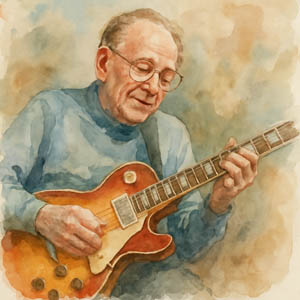— Les Paul
 Widely revered as “every electric guitarist’s grandfather,” Les Paul (1915–2009) revolutionized music as the inventor of the electric guitar and a pioneer of recording innovation.
Widely revered as “every electric guitarist’s grandfather,” Les Paul (1915–2009) revolutionized music as the inventor of the electric guitar and a pioneer of recording innovation.
Born Lester William Polfuss in Waukesha, Wisconsin, he began strumming as a child and was broadcasting on local radio by age 17. “You have to give up everything if you want to be a good guitar player,” he once said. “Play around the clock.”
Unsatisfied with the limitations of acoustic sound, he spent weekends at Gibson’s Epiphone factory in New York, crafting a 21-pound solid-body prototype called *The Log*. “Of course, everybody had me labeled as a nut,” he laughed.
In 1952, Gibson released the Les Paul solid-body guitar—a defining moment in history. “I just can't imagine my home without guitars everywhere,” he said with joy.
With fearless creativity and endless curiosity, Paul revolutionized the studio. He pioneered close miking, overdubbing, and invented the eight-track recorder—ushering in a bold new era of multi-tracked sound.
“Playing a joint keeps me alive,” said the jazz/country/blues virtuoso, who performed well into his 90s. “My secret is to keep going, keep working.”
As blues rocker Jon Paris put it, “All roads lead to Les.” The Gibson Les Paul became the trusted companion of guitar greats like Eddie Van Halen, Jeff Beck, Jimmy Page, and more.
In 2005, the Wizard of Waukesha was inducted into the National Inventors Hall of Fame. One of his beloved guitars—a 1955 model—sold for $45,600, echoing a legacy that plays on.
 Practice unlocks the music inside you.🎶🎸
Practice unlocks the music inside you.🎶🎸
